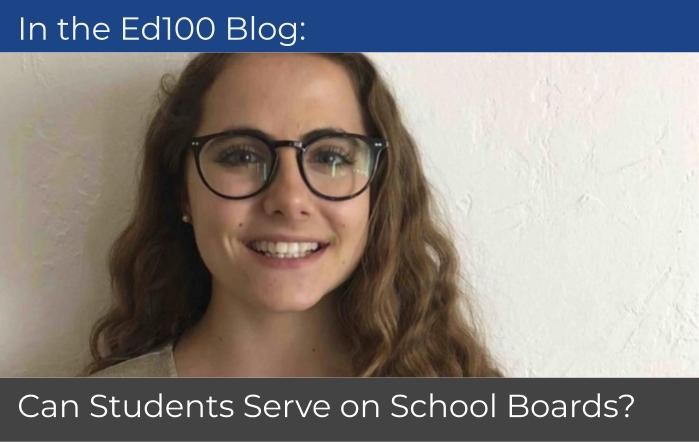Open Meetings: How the Brown Act Works

What You Need to Know About Open School Board Meetings
The Brown Act plays a big role in how school board meetings are run in California. If you want to speak to your school board, run for a seat, or serve as a student school board member, you need to understand the basics. The Covid-19 pandemic required some changes, which are discussed in this post.
The Brown Act: History and Why It's Important.
The Brown Act, or Open Meeting Law, is designed to ensure that public meetings are open and transparent, enabling the general public to know when and where meetings are to be held, what is to be discussed, and how to comment on the matters at hand. The Brown Act was adopted by the California State Legislature in 1964 and was substantially overhauled in 1993. The California State Legislature makes updates from time to time. The Pandemic drove some important changes.
To Whom Does the Brown Act Apply?
The Brown Act applies to all legislative bodies, which includes the governing body of a local agency or any other local body created by state or federal statute. This includes city councils, county boards of supervisors, school boards, county boards of education, and charter school boards. All subcommittees and commissions created by formal action of a legislative body are included, too, even if they are temporary or advisory.
There is an exception for ad hoc advisory committees consisting solely of less than a quorum of the legislative body. (Need to brush up on rules like the meaning of a quorum? The League of California Cities has concise explanations.)
If you were just declared the winner of a school board race, congratulations! But guess what? The Brown Act now applies to you, too. You are expected to abide by the laws even if your swearing-in and first official school board meetings are weeks off.
What’s a Meeting?
Under The Brown Act, a meeting is defined as any occasion in which a majority of the voting members of the board come together at the same time and location, including teleconference location, to “hear, discuss, deliberate or take action on any matter that is within the subject matter jurisdiction of the legislative body.” If your school board has five voting members, a majority is three. If your school board has seven voting members, a majority is four.

Until the Pandemic forced changes, the majority of meetings took place as you would imagine — inside a physical structure like an office of education or school gymnasium. Technology expanded the definition of a meeting, probably permanently. The Brown Act permits meetings by audio or video teleconference as long as all other meeting requirements are met. Additionally, an agenda must be posted at each location and members of the public are still allowed to comment. All votes or decisions must be recorded by roll call vote.
Three Types of Meetings
There are three types of meetings: regular, special and emergency. All must generally be properly noticed, identifying the day, place and time, with a posted agenda of items to be discussed, and how public comment will be accepted. But each is a little different to allow flexibility for different needs.
|
Three Types of Meetings |
|
|---|---|
|
Regular |
A regular meeting is just that — a regular gathering to discuss regular school board business. These regular meeting dates are normally set at an annual organizational meeting and they occur throughout the school year. |
|
Special |
Special meetings may be called at any time by the board president or a majority of school board members. All Brown Act requirements must be met, but only a 24 hour notice is to be given. Any topic can be discussed except the salary and benefits of certain high-level employees. |
|
Emergency |
Emergency meetings can be only be called when critical, pressing needs are at hand that must be addressed within 24 hours. (Think severe disruption to school district operations due to a natural disaster or other catastrophic event.) Even then, notice must be given through local media if requested, and minutes, papers and other materials related to the meeting must be posted for 10 days. |
Where's the Meeting?
Prior to the Pandemic, all meetings were required to occur within the jurisdictional boundaries in which the legislative body operates. In most cases this meant that the school board meeting had to take place within the school district’s boundaries. There were always some exceptions, such as for acts of nature, interviewing a superintendent for hire, or the inspection of property or equipment that can’t be easily transported. This provision was meant to ensure that the business of the community was discussed close to home operations.
For charter schools and charter school networks, the location requirements were less obvious. If a charter school board operates one or more charter schools in the same county, it had to meet within the physical boundaries of the county where the school is located. If a charter school board runs multiple schools in multiple counties or is a non-classroom charter school (such as an online school) the board must meet within the county were it has the most students. There is still a requirement to make board meetings accessible physically. Effective January, 2020, SB 126 required all charter schools to install two-way teleconferencing equipment.
How the Covid-19 Pandemic Affected the Brown Act
The Brown Act was created with the expectation that most official meetings would be conducted in person; The COVID-19 pandemic demonstrated the importance of enabling government business to be conducted virtually. On March 12, 2020, Governor Newsom issued Executive Order N-25-20, which set new rules for the duration of the declared emergency. For school boards, the most important provisions, in section 11 of the order, establish that it's OK for school boards to meet online, but that they must do so in a way that provides public notice and public access. There's one provision that might trip up some boards: you have to publicly announce one publicly-accessible physical location where it will be possible to view and participate in the meeting.
Serial Meetings
Oops, this conversation just became a meeting!
Progress in technology has amplified a complication: it's pretty easy for meetings to happen accidentally. For example, a majority of board members copying each other on emails or casually commenting on Facebook posts might just become the equivalent of a meeting and trigger Brown Act noncompliance. Board members need to be extremely careful about emails, posting to social media and being tagged in posts. Discussions that play out through messages are known as serial meeting violations of the Brown Act.
Board members are allowed to come together for social or ceremonial purposes such as graduations as long as a majority of them are not discussing any matter that may come before them at a school board meeting.
Violating the Brown Act can expose board members to litigation and potential individual liability. It can also be the basis for board actions to be overturned. As a matter of caution, you may see board members sitting separately at events in order to avoid any appearance of impropriety.
Are Charter Schools Different?
A little. SB 126, which was signed into law in March, 2019 to take effect in January 2020, requires charter schools to adhere to the Brown Act. Charters authorized by the State Board of Education have to adhere to the The Bagley-Keene Open Meeting Act, a similar set of open meeting laws that govern California state boards and commissions.
What Does It Mean to "Notice" a Meeting?
The Brown Act requires that the time, place and agenda for a regular meeting be released at least 72 hours in advance of the time of the meeting. The notice of meeting and the agenda must be posted in a place that is freely accessible to the public, and the agenda must be posted to the school district’s website through a prominent link. (This requirement was enacted by the California State Legislature in 2018 and became effective in 2019).
The board may only discuss and act upon what is upon the written agenda.
A written agenda must be provided, with a brief description in clear language of each item to be discussed. This is so the public knows without ambiguity what is to be discussed and voted upon. The board may only discuss and act upon what is on the written agenda. This prevents board members or others from commandeering the meeting and calling a vote to support a pet project or other cause that is not on the agenda.
You, as a member of the public, are allowed to submit items to be considered for a future agenda. If you want to change policies about school lunches, for example, contact your district’s superintendent and ask that the item be added to an upcoming agenda.
Who Gets to See the Documents?
Any documents distributed to all or a majority of the board by any person are public records. Additionally, any documents that are made public need to be made public to everyone. For charter schools, SB 126 requires compliance with the California Public Records Act. The League of California Cities has a thorough guide.
What is Closed Session?
Some discussions and actions are too sensitive in nature to be open to public scrutiny. These items are discussed or negotiated in what is called a “Closed Session.” Closed session items are likely to include direction to negotiators on collective bargaining issues, discussion of lawsuits and potential litigation, superintendent employment reviews or appraisals, employee disciplinary actions, appointments and dismissals, serious student conduct issues or expulsions, real estate transactions or negotiations.
Although the discussions are closed to the public, an agenda describing the topics at hand in clear language still must be posted 72 hours in advance, and the board must take public comment prior to the session. At the end of the closed session, there must be a “report out” in open session to disclose any actions taken.
Public Participation: Your Voice Allowed.
The public must be given the opportunity to address the board on any item on the agenda, and on any item that is within the subject matter jurisdiction of the legislative body. If you are unhappy with school lunches, and it isn’t on the agenda, this is your opportunity to tell board members about it.
The public is given this same opportunity at closed and special sessions as well.
Public comment need not be a free-for-all. The school board may place “reasonable” time limits on the comments, and must double the amount of time available if the comment needs to be translated. You also cannot be stopped because your comments are unfavorable.
However, “reasonable time limits” can be interpreted in different ways. If you’ve ever tried to give a complete and coherent argument in one minute, you understand the challenge. Introducing yourself and your topic can easily chomp up 10 seconds. To some boards, “opportunity to address the board” looks different as well. In Berkeley, the school board limits public comment strictly to 30 minutes, and can draw speakers by lottery. In Oakland, members of the public sign up online to speak.
Writing it all down…
For all its attempts at openness and transparency, the Brown Act does not require official minutes of the meeting to be taken or published. But school boards are not off the hook. Several other laws cross with the Brown Act. For example, Education Code 35145 requires minutes be taken and made available to the public.
Charter school boards are subject to these requirements, too, and must record meetings (audio, video or both) and post them to the school’s website.
Parent Committee Meetings and the Greene Act
Another set of open meetings laws called the Greene Act governs some parent committees such as school site councils and English Language Advisory Committees.
Are PTA meetings subject to open meeting laws?
The Greene Act matches the open meeting structure of the Brown Act, but loosens it to encourage more parents to participate without fear of penalties or criminal charges for violations. Committees that operate under the Greene Act must provide notice of meetings 72 hours in advance, including a published agenda. The meetings must be open to the public and allow public comment on matters under their purview.
However, there is no “closed session,” and parents are allowed to communicate with each other about committee business outside of meetings without restriction. As a kind of speed bump, committee members cannot vote on items not included in the agenda unless they unanimously vote to do so. If procedure is not followed, upon the request of any individual, the committee is to defer discussion of the item to the next meeting after allowing for public comment.
In case you are wondering if PTA board meetings fall under the Browne Act or Greene Act, the answer is no. PTAs are not legislative bodies as described by the California State Legislature and are not regulated by the same set of meeting laws required by school boards. However, it is likely that many PTA bylaws include provisions written in a way that do not obviously permit virtual meetings. Time to update your meeting policies!
Updated March 2020. Updated September, 2021.
 Leslie Reckler is President of the Bayside Council of PTAs, the umbrella organization that serves the 30+ PTAs in the West Contra Costa and John Swett Unified School Districts. She's the mother of two and a passionate advocate for public education.
Leslie Reckler is President of the Bayside Council of PTAs, the umbrella organization that serves the 30+ PTAs in the West Contra Costa and John Swett Unified School Districts. She's the mother of two and a passionate advocate for public education. Tags on this post
Brown Act Civics Districts Policy School board PandemicAll Tags
A-G requirements Absences Accountability Accreditation Achievement gap Administrators After school Algebra API Arts Assessment At-risk students Attendance Beacon links Bilingual education Bonds Brain Brown Act Budgets Bullying Burbank Business Career Carol Dweck Categorical funds Certification CHAMP Change Character Education Chart Charter schools Civics Class size CMOs Collective bargaining College Common core Community schools Contest Continuous Improvement Cost of education Counselors Creativity Crossword CSBA CTA Dashboard Data Dialogue District boundaries Districts Diversity Drawing DREAM Act Dyslexia EACH Early childhood Economic growth EdPrezi EdSource EdTech Effort Election English learners Equity ESSA Ethnic studies Ethnic studies Evaluation rubric Expanded Learning Facilities Fake News Federal Federal policy Funding Gifted Graduation rates Grit Health Help Wanted History Home schools Homeless students Homework Hours of opportunity Humanities Independence Day Indignation Infrastructure Initiatives International Jargon Khan Academy Kindergarten LCAP LCFF Leaderboard Leadership Learning Litigation Lobbyists Local control Local funding Local governance Lottery Magnet schools Map Math Media Mental Health Mindfulness Mindset Myth Myths NAEP National comparisons NCLB Nutrition Pandemic Parcel taxes Parent Engagement Parent Leader Guide Parents peanut butter Pedagogy Pensions personalized Philanthropy PISA Planning Policy Politics population Poverty Preschool Prezi Private schools Prize Project-based learning Prop 13 Prop 98 Property taxes PTA Purpose of education puzzle Quality Race Rating Schools Reading Recruiting teachers Reform Research Retaining teachers Rigor School board School choice School Climate School Closures Science Serrano vs Priest Sex Ed Site Map Sleep Social-emotional learning Song Special ed Spending SPSA Standards Strike STRS Student motivation Student voice Success Suicide Summer Superintendent Suspensions Talent Teacher pay Teacher shortage Teachers Technology Technology in education Template Test scores Tests Time in school Time on task Trump Undocumented Unions Universal education Vaccination Values Vaping Video Volunteering Volunteers Vote Vouchers Winners Year in ReviewSharing is caring!
Password Reset
Search all lesson and blog content here.
Login with Email
We will send your Login Link to your email
address. Click on the link and you will be
logged into Ed100. No more passwords to
remember!














Questions & Comments
To comment or reply, please sign in .
jose maldonado March 17, 2023 at 10:25 pm
Leslie1 March 18, 2023 at 12:54 pm
Leslie1 March 18, 2023 at 12:54 pm
Kevin Larsen August 28, 2020 at 9:27 pm
I want to know, can a Brown Act committee (during this time of Covid) table email concerns
requested to be handed (by virtual email) to each committee member?
Leslie1 March 18, 2023 at 1:02 pm
tom nelson August 26, 2020 at 6:28 am
( https://leginfo.legislature.ca.gov/faces/codes_displayText.xhtml?lawCode=EDC&division=4.&title=2.&part=30.&chapter=2.&article=7 )
Leslie1 March 18, 2023 at 3:05 pm
Angelica Jongco August 24, 2020 at 9:26 pm
Anna Meza June 8, 2020 at 12:42 pm
Leslie1 August 9, 2020 at 10:23 pm
Denise Dafflon September 11, 2019 at 11:18 am
If DELAC was used to be under Brown Act, are there step needed to change to Green Act (board policies? district policies?)?
Leslie1 December 17, 2019 at 6:19 pm
kittycahalan September 3, 2019 at 3:22 pm
tom nelson August 27, 2019 at 2:23 pm
Are LCAP Parent Advisory Committees governed by the Brown Act or the Greene Act?
( Perhaps explain in plain words Ed Code Section : 35147 )
Leslie1 August 28, 2019 at 9:45 pm
Jennifer B August 27, 2019 at 9:33 am
Leslie1 August 28, 2019 at 8:45 am